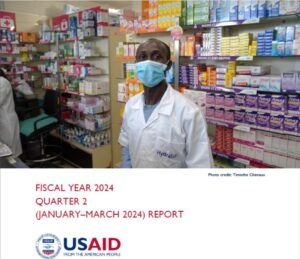Development and evaluation of a continuous quality improvement programme for antimicrobial stewardship in six hospitals in Uganda
AMR is the phenomenon where bacteria and other infectious agents no longer respond to treatments, and it is dramatically accelerated by the overuse and misuse of antibiotics and other antimicrobials in people and animals. Antibiotic-resistant infections directly resulted in the deaths of more than 1.2 million people in 2019, according to The Lancet.
The new study—“Development and evaluation of a continuous quality improvement program for antimicrobial stewardship in six hospitals in Uganda”—examined steps taken by the hospitals from June 2019 to July 2022 to better manage the use of antimicrobials by clinical staff through continuous quality improvement (CQI), training, and mentorship. CQI is an iterative process for identifying performance challenges, developing and testing interventions to address those challenges, and mainstreaming the interventions into health facility practices.
The overarching finding of the study was that fewer patients received unnecessary antimicrobials as a result of the interventions. The proportion of patients who were given a single antibiotic for the treatment of urinary tract infections (UTIs) increased from 48% to more than 73%, while the number of antimicrobials per patient treated for UTI was reduced by almost 20%. The study also identified a significant increase in the prescription of appropriate antibiotics for the treatment of UTIs.
Using the World Health Organization’s (WHO’s) antimicrobial stewardship (AMS) toolkit, the hospitals set up AMS programs and developed interventions employing CQI techniques specifically targeting conditions commonly associated with antibiotic misuse, including UTIs and upper respiratory tract infections (URTIs). Quarterly antibiotic use surveys were conducted to assess the effectiveness of the interventions.
“Plenty of studies document the problems of antibiotic misuse with recommended actions, but too few prove what works to address these problems in resource-constrained settings,” said Niranjan Konduri, a senior author of the study and pharmaceutical systems expert with global health NGO Management Sciences for Health. “Our data-driven study shows what is feasible and replicable, and it adds to the growing body of evidence that CQI approaches can be effective in improving antibiotic use and combating AMR, even in resource-constrained settings.”
The authors recommend that countries’ Ministries of Health mandate AMS interventions and adopt at a national level the approaches used by the hospitals in this study. They also call for surgical prophylaxis guidelines in Uganda as a key step in improving antibiotic use and emphasize the need for more capacity building on antimicrobial use surveillance in Uganda and other low-income countries to strengthen AMS programs and inform future interventions.
Dr. Henry Kajumbula, Chair of Uganda’s National Antimicrobial Resistance Sub-Committee and faculty member at the Medical Microbiology Department of Makerere University College of Health Sciences, stated, “This study demonstrates that it is possible to optimize the use of antibiotics while assuring patient safety and quality of care. Uganda needs to find ways to reproduce these proven interventions in other health facilities throughout the country in line with the objectives of our National Action Plan on AMR and WHO’s International Health Regulations Benchmarks on optimizing use of antibiotics.”
The study, which looked at data for 7,037 patients diagnosed with UTIs, showed an increase in the use of nitrofurantoin, the first-line essential antibiotic for the management of those infections. It also showed an increase in the proportion of patients who received no unnecessary antimicrobials for URTIs from 26.3% to 53.4%. The mean number of antimicrobials per URTI patient was reduced by 20.7%, while no significant reduction was observed for surgical antibiotic prophylaxis patients.
By Reuben Kiggundu, JP Waswa, Hilma N Nakambale, Francis Kakooza, Hassan Kassuja, Marion Murungi, Harriet Akello, Seru Morries, Mohan P Joshi, Andy Stergachis, & Niranjan Konduri
